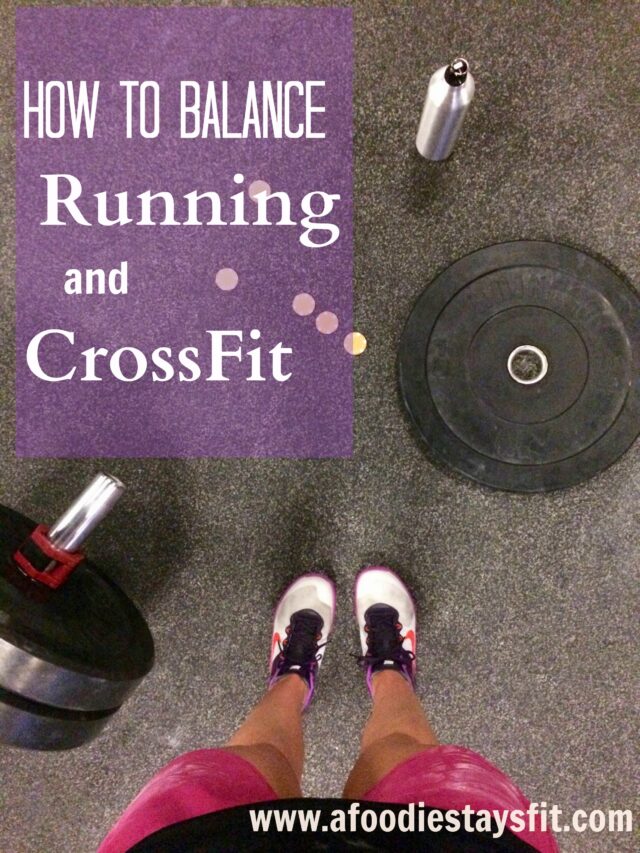

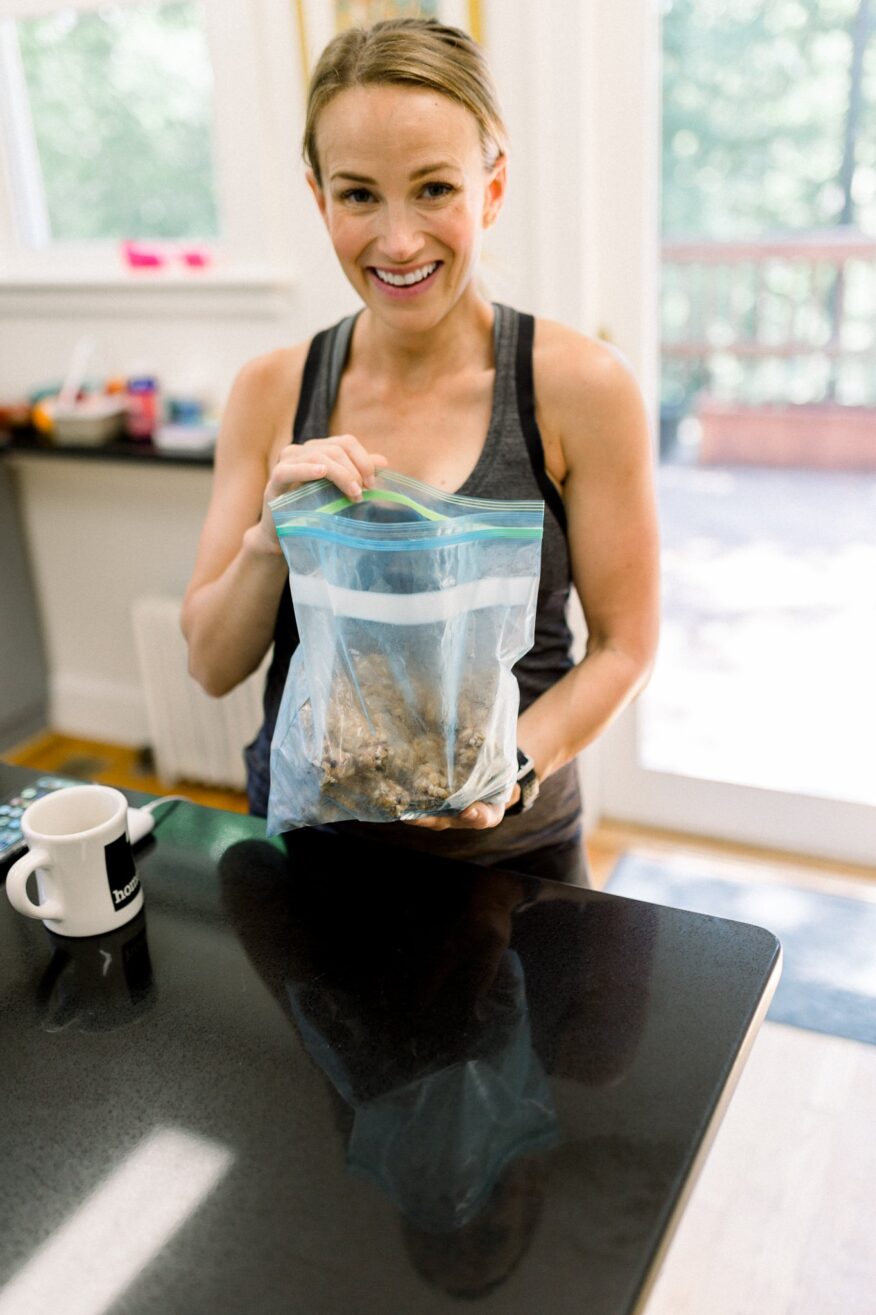
When you train for a marathon, you have a training plan, right? But do you have a plan for your diet? You can’t overlook nutrition, especially as the miles ramp up!
When training for a marathon, you may be running 40-80 miles a week on on top of a full-time job, full-time parenting, or both! You may be so focused on getting in the miles that you just grab whatever food is convenient and quick throughout the day. But focusing on your marathon training diet is just as important as logging the miles. And while I’m not training for a marathon right now, I many people are planning to do fall races, so I wanted to share some tips on fueling since training and race day nutrition is SO important.
When I’m logging serious miles, I often get asked what I eat in a day. And, to be honest, it’s not very exciting. When I was training for the 2018 Boston Marathon and then again, for the 2019 race, I ate pretty simply for a few reasons:
I don’t mind eating the same thing over and over because it’s less thinking. 🙂 Plus, when I was training in 2019, I was working a LOT on top of a pretty intense training schedule, so convenience was key!
It’s faster to eat simple things! Tossing things with olive oil, salt and pepper — which is how I serve basically everything — is faster than following a recipe.
When my mileage ramps up, my stomach often gets more sensitive. Heavily processed carbs (e.g. white bread, crackers, etc.) and dairy wreck me. As a result I tend to eat the same things that I know work for me.
When you’re training for a marathon, it’s easy to overlook your diet and sleep. But both are crucial to your success. Plus, most of us know too well that awful feeling on a run when your gut gets MAD and you immediately think back to what you ate the night before. And stomach aches aside, how you fuel your body contributes to how you perform. It can contribute in a positive manner or undermine your running. And wouldn’t you rather have your food add to your success?
You simply can’t ignore nutrition when you’re going after a PR or tackling a hard distance.
While I use a training plan or a coach for my marathon training, I don’t use a true “meal plan”. I just eat things I know will make me feel great, agree with my stomach, and keep me full. Oh, and I eat LOTS of carbs and I eat all day long (especially when running and breastfeeding!). But if you really don’t know much about nutrition, it may be worth working with a registered dietician who specializes in athletic performance to help you identify where you may need to make some adjustments.
InsideTracker is a great tool to help you identify gaps in your nutrition as well. I also have a lesson in my running course about what to eat before, during and after a run.
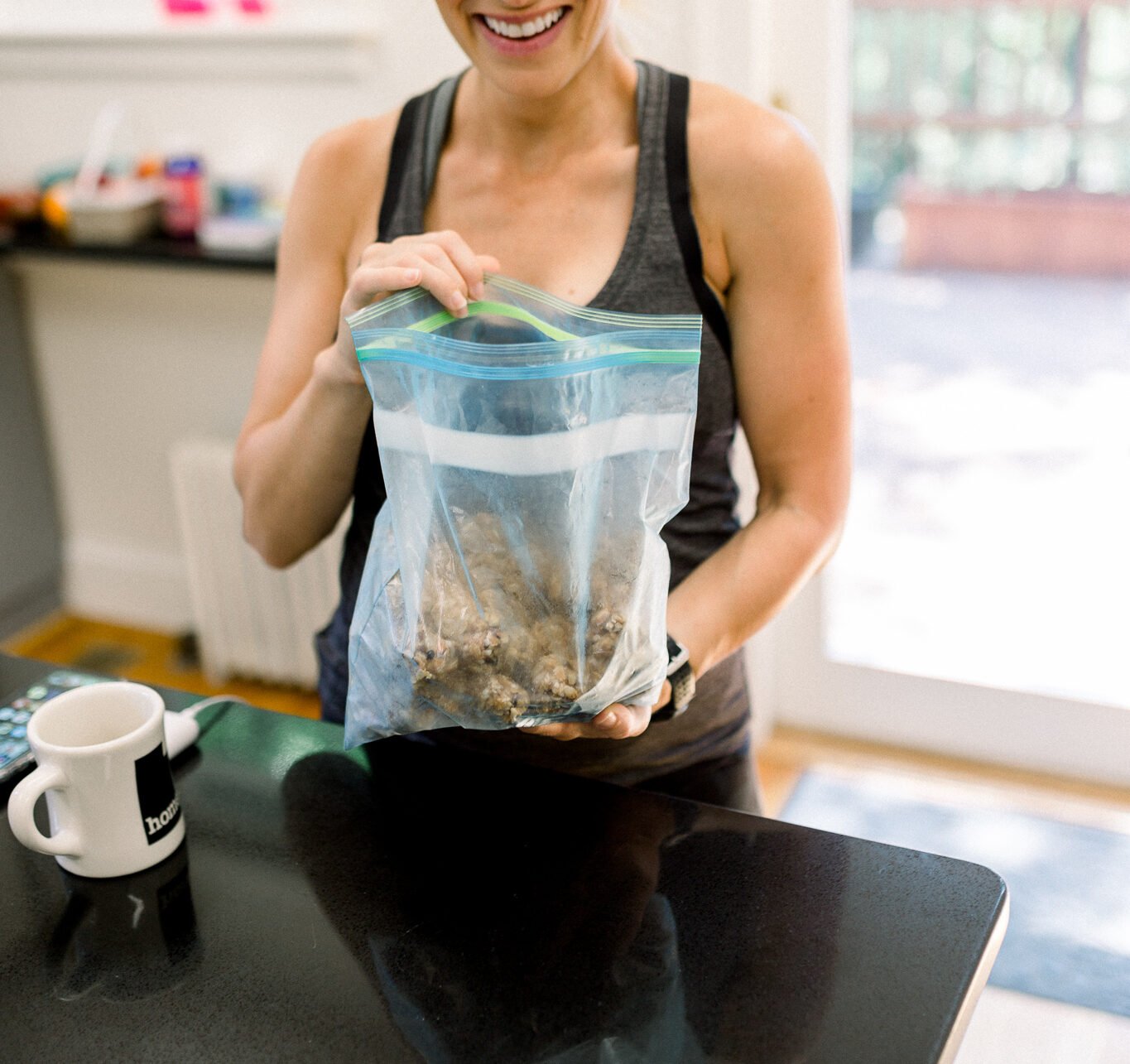
What a marathon runner eats will differ from person to person. We all have different preferences, mileage levels, goals, body weight, and food sensitivities (or lack there of). What’s consistent is that carbs are super important for all runners. A good rule of thumb is to aim for 4 grams of carbohydrate for every pound of body weight. If you like to look at percentages, endurance athletes (which is most runners who run 4+ times a week) should get 55-65% of their calories from carbs. Some elite runners have shared that they even get 70% or more of their calories from carbs. The general consensus for runners among those who study the data around marathon running is that low carb diets do NOT work.
The first three have recipes, as well as information about the various aspects critical to runners’ diets. The last one talks about the importance of timing certain macronutrients for performance and recovery. This post about the importance of carbs is also a must read.
A simple thing to analyze is simply paying attention to any neglected food groups. Do you eat a LOT of protein but not many carbs, e.g. keto? If you’re relying solely on vegetarian protein sources, make sure you are getting enough protein to help your muscles rebuild and recover.
Or maybe you love fat (e.g. nuts and nut butters), but neglect protein. Ask yourself if the fats you’re eating are healthy fats (from nuts and healthy oils) or if they are coming from trans fats and fried foods. Or maybe you get 99% of your calories from carbs? And what types of carbs are you eating? Are they mostly processed (e.g. crackers, pretzels, cereal) or do you have some non-processed carbs as well (e.g. potatoes, fruit, rice, whole-grain bread, etc.)
There is definitely a time and place for processed carbs (the Nutrient Timing book explains that well) but you should also make sure you focus on getting high-quality, slow digesting carbs too!
I’ll eat a couple energy balls or a couple pieces of toast with honey. Other times I’ll do a sliced banana with peanut butter. And I also have a water with LMNT, my favorite electrolytes. If I’m doing toast, I like Dave’s Killer Bread, which I get at Costco but most stores carry it. During my run, I’ll also sip on LMNT and possibly have an energy gel if it’s a long run.

My breakfast is never anything really glamorous – just some kind of eggs and toast, steel cut oats with peanut butter and berries, a bagel with dairy free cream cheese or a smoothie bowl. Sometimes I’ll break my breakfast into two meals about an hour apart if I really can’t stomach eating too much right after training sessions. (I almost always run in the morning.)
But, I do make sure to have some toast or a small bowl of oatmeal within 30 minutes of finish to help replenish my glycogen stores. Then, I’ll eat another round of breakfast about an hour later. This apple oatmeal bake is a go-to once it cools down since I can make a batch on Sunday and eat it all week.
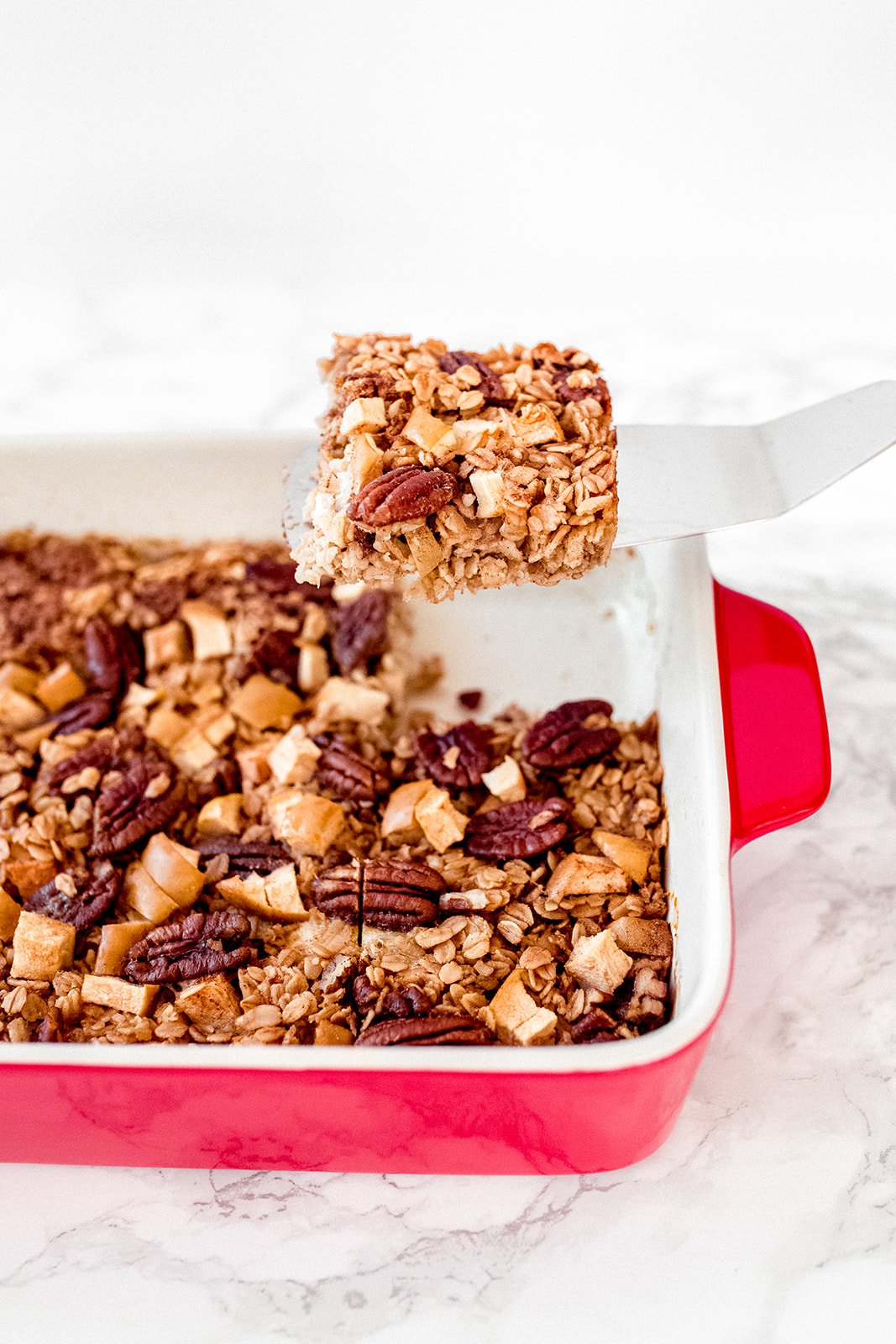
I make lunch at home most days, usually a salad with protein, like chicken or tuna, with a side of toast and/or an apple. I don’t spend a ton of time on putting together the salad, since I usually have meat already grilled or I’m just popping open a can of tuna or salmon. If I’m craving a sandwich or wrap, I’ll stuff it with deli turkey, cucumbers, avocado and lettuce. Other times I make an open-face tuna sandwich.
Most of our dinners are pretty simple. It’s sort of protein (beef, chicken, salmon or lentils) + sweet potatoes or brown rice + whatever veggies are in season. I don’t love pasta but Tommy does so we typically have a pasta-based meal at least once a week as well.
I have 3-5 snacks a day, sometimes more. I eat when I’m hungry! So I have a snack between breakfast and lunch, and 2-3 snacks between lunch and dinner. And sometimes I eat a snack right before bed. My go-to snacks include:
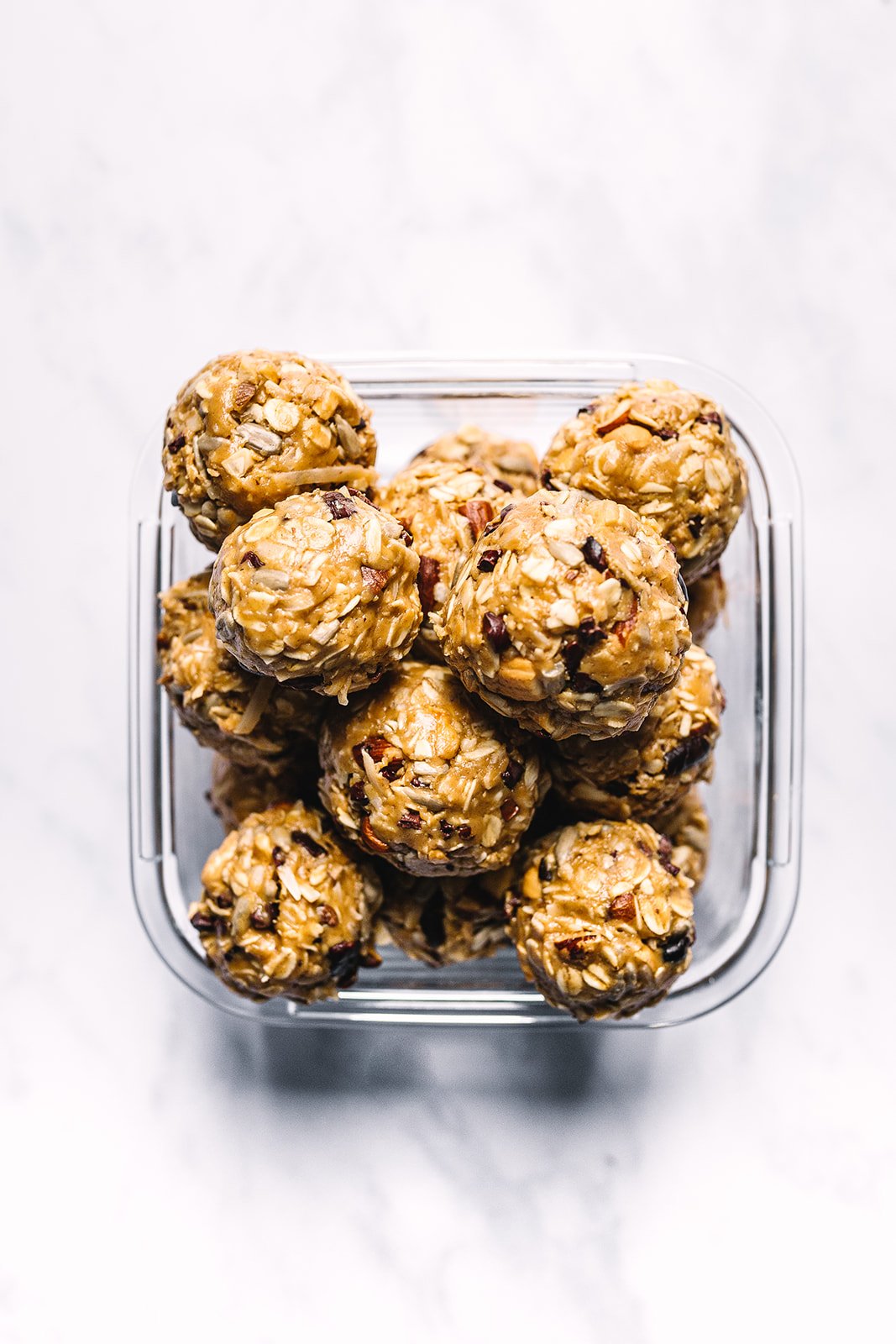
And at least two of my snacks involve toast. Toast is my favorite food and it’s a great way to get in some carbs without leaving me feeling overly full. Typically, one of my afternoon snacks is buttered toast with a handful of trail mix and my evening snack is toast with peanut butter. (I like Dave’s Killer Bread, Ezekiel sprouted english muffins or Silver Hills sprouted bread. Or homemade wheat bread if I have that around!)
I can eat toast 20 minutes before a run but anything heavier than that, I need about 30 minutes for food to digest!
It’s not uncommon for runners to gain weight while training for a marathon. Sometimes it’s because they overestimate how many calories they burned and underestimate how much they are eating. The “I earned this!” mindset can also lead to not so great choices. Yes, eat dessert and enjoy your favorite foods. But training for a marathon isn’t a free pass to eat anything you want all time.
Conversely, many marathon runners don’t eat enough during training — I’ve run into this issue myself. That will make your runs miserable, prevent you from recovering well, and also may lead to metabolic issues that could impact your weight. And for females, underfueling can lead to the female athlete triad which has many more serious implications than a number on the scale.
I’m not a registered dietician so if you think you’re dealing with a calorie imbalance, work with a registered dietitian to identify and address the issue.
One of the biggest things to figure out in marathon training is what foods work for you and what don’t. In the last few weeks leading up to race day, your marathon training diet and nutrition plan should be pretty honed in!
During high periods of stress — physical and/or emotional — my sensitivity to certain foods gets worse and I have more severe GI issues. When that happens, I have to be very intentional with eating food that isn’t overly processed and sometimes eliminating some gluten-rich foods and dairy. Sometimes even gluten-free but processed foods will upset my stomach, will you’ll see noted below.
For any training run where I have gut issues, I note in my Strava training log what happened and what I’d eaten 1-2 days before that I thought may be triggers. (It can take a couple days for food to work through your system and rear it’s angry head. Other times, it’s an immediate gut upset.) Taking food notes along with the training notes helped me pinpoint that dairy was a major trigger, as well as anything too processed with gluten. I do MUCH better with sprouted bread products than I do white flours or anything super processed.
Okay, onto specifics! Here are two sample days of meals. Remember that the exact portions that you eat will be dependent on your mileage, intensity gender and body size! Don’t follow exactly what I eat since we probably don’t train at the same intensity, run the same distances everyday or weigh the same. Note that I’m not training for a marathon right now, but I am currently running 5-7 miles, 5x a week, so hitting about 25-35 miles a week currently.
You can see another example of what I eat in a day (on a 7 mile day) here.
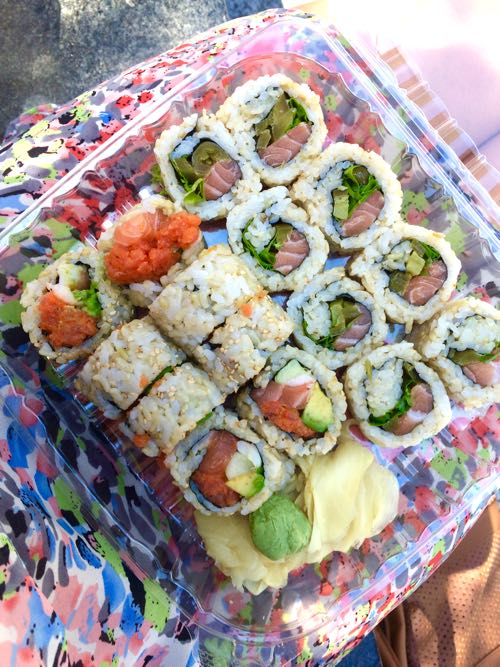

You can’t ignore your diet if you want to see improvements in your running, especially when running a marathon. Educate yourself on the basics of sports nutrition and then start to pay attention to what you eat. And remember, figuring out what foods work well for you may take some trial and error. So practice is as part of your training and not in the final days before your big race!

Shop The Post


Leave a Comment
18 responses to “Marathon Training Diet + What I Eat in a Day”
This is so helpful! I am curious about alcohol … is that something you cut out completely while training?
Curious about how long after a long run you eat (10 miles +)? I’m never hungry right away and usually end up just grazing all.day.long. I’m thinking of trying more of a snack and then waiting an hour os so after before really eating.
Even though I’m not training for a marathon, or any race for that matter, I really enjoyed reading about what you eat in a day. Would love to see more posts like these – great ideas! I don’t often see you talk about your eats/nutrition on a daily basis (since you do 362 other important things!), so I was curious how you fuel your busy life. xx Hill
Your link to Oatmeal Apple breakfast bake actually goes to the tahini energy balls. Can you fix it – I really like baked oatmeal and might be able to get my teenage boys to eat something like this! Thank you.
ah thanks for letting me know! I just updated it – and here’s the link! It works well with any fruit / nut combination! 🙂
https://terilynadams.com/2012/12/easy-gluten-free-oatmeal-apple-breakfast-bake/
I appreciate you sharing your daily eats while training. It would be awesome to continue to see these recaps in the future. Do you think that you have added other non-gluten foods into your diet in order to compensate for the gluten filled foods you don’t eat? I honestly don’t think I could survive without bread … but that’s just me! 🙂
Gosh, I’ve been eating gluten-free for so long that I don’t feel like I’ve really increased other foods to compensate. But, I do eat potatoes at nearly every meal, breakfast, lunch and dinner, every day (not joking) – I LOVE THEM. I also use gluten-free toast to fuel for my long runs. Sometimes I eat rice & oats but I just prefer potatoes! I also eat plantains a few days a week (another favorite!). I also get carbs from fruit and dried fruit!
This is super helpful! I struggle with tummy troubles a lot too and need alllll the suggestions I can find. Please post more recaps 🙂 especially rest days and long run days! Thanks for the inspiration! Hope you have a wonderful week of training!
Will do!! I’ so glad this was helpful!
On the day you had the post run nuun and breakfast, do you think it could have been the nuun that contributed to the upset stomach? I love nuun but I discovered it really made my stomach wonky so I had to stop using it…food for thought that maybe a homemade sports drink with salt and citrus might help if that’s the case!
hmmm I don’t think so since I have nuun almost every day but I’m going to start paying attention to it more!!! Never even crossed my mind it could be that. THANK YOU!!!
I’m curious to know what the difference is between energy balls and protein bars/balls? I’ve struggled with my sleep for years (just finished reading your blog post about how your sleeping is,etc…) unfortunately, I only get 1.5-2 hours of sleep a night, and workout 6; sometimes 7 days a week. I feel like I’m always exhausted, starving, but also just feeling blah… I always seem to hit an afternoon slump and crave a protein bar and tea. I’ve been looking for low calorie high protein bars but not many are available with clean ingredients. I love the recipes you’ve linked… I will give them a try! 🙂
i’m not training for a marathon- would love to but not in the cards for me right now. but i loved this post! it’s always so nice to hear ideas for meals/snacks and good to know other people try to keep things simple!??
I think simple food is often the best food! And it frees up time and brain space to focus on other things!!
This is really useful! I’m interested in booze. Are you entirely avoiding that when you coach?
I have an entire post about my approach to alcohol when I’m training. Read it here.
Very interesting to see how much carbs you have on your training days. I feel really sluggish if I have carbs before or after running so I usually load up on my proteins and nuts. But I guess balance is key since you also have a balance of protein, fibre and grains throughout.
On a side note, InsideTracker looks to be very helpful. I don’t think it is available in Australia, where I am based. Do you have other recommendations?
Thanks for your comment!
I’m sorry, I don’t know of similar InsideTracker options in Australia!